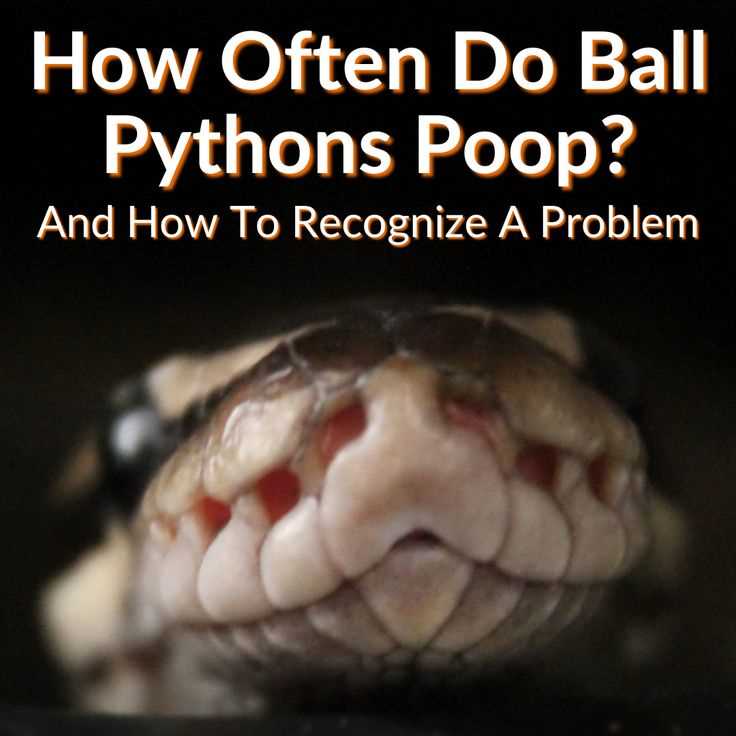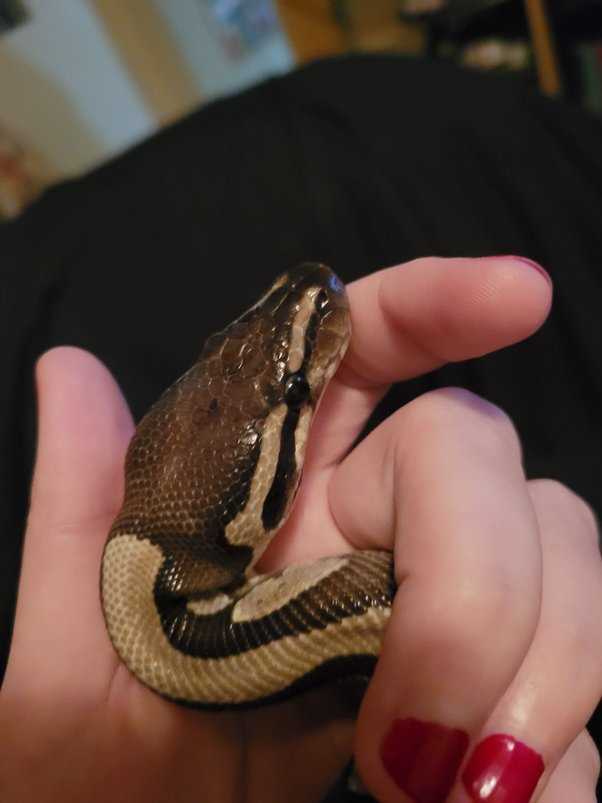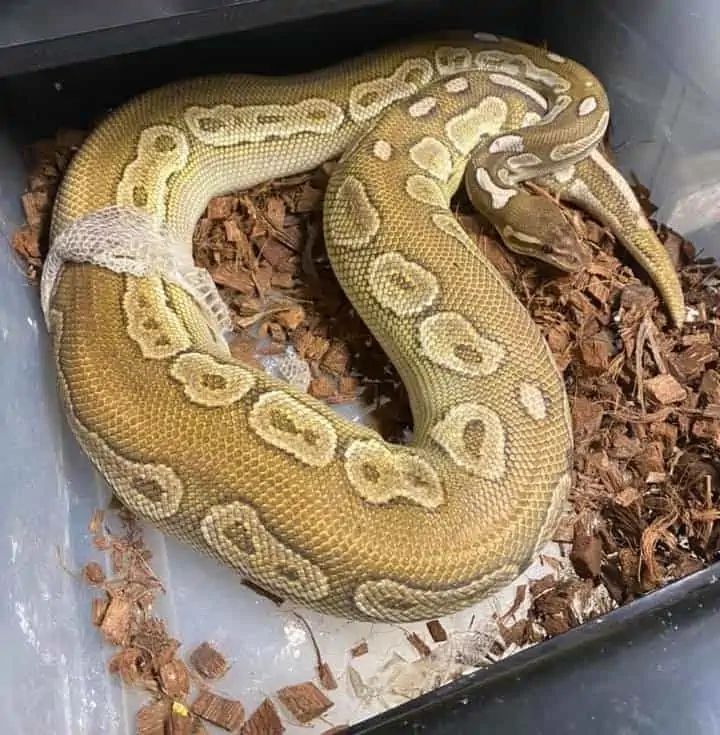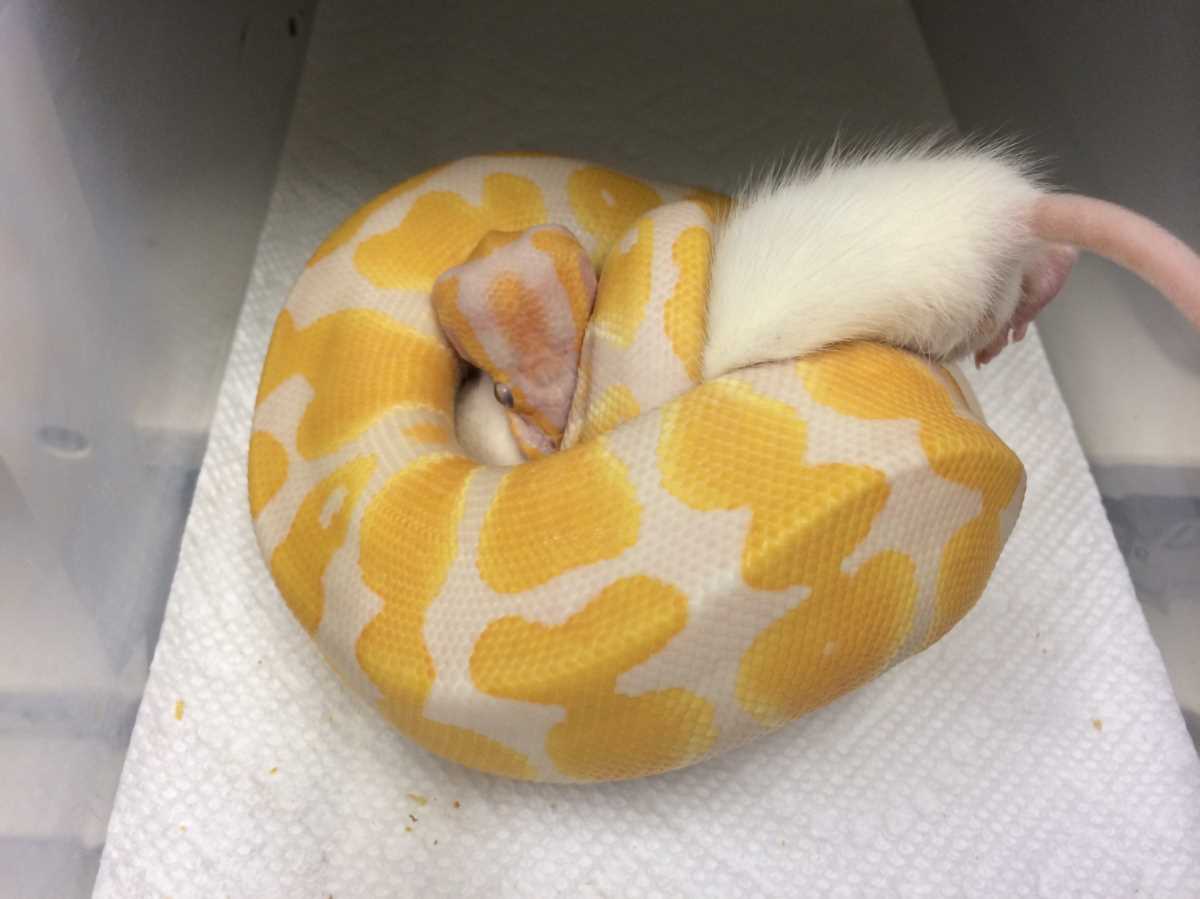
So, how often do ball pythons actually poop? Well, the frequency of bowel movements in ball pythons can vary depending on various factors, including their age, size, diet, and overall health. Generally, adult ball pythons tend to defecate less frequently than younger snakes. On average, you can expect your ball python to poop about once every 1-2 weeks.
Providing your ball python with a proper diet and an appropriate enclosure is key to maintaining regular bowel movements. A balanced diet that consists of appropriately sized prey items and proper hydration is essential. Additionally, maintaining proper temperature and humidity levels in their enclosure can also contribute to healthy digestion in ball pythons.
Factors Affecting How Often Ball Pythons Poop
1. Diet: The type and amount of food a ball python consumes can affect its digestion and elimination process. A diet rich in rodents, such as mice or rats, provides the necessary nutrients for the snake to grow and maintain its health. However, excessive or inadequate feeding can disrupt the snake’s digestive system, leading to irregular pooping patterns.
2. Temperature: Ball pythons are ectothermic reptiles, meaning their body temperature is regulated by their environment. Maintaining the appropriate temperature gradient in their enclosure is crucial for their overall health and digestive function. If the temperature is too low, their metabolism slows down, and digestion may be delayed, resulting in less frequent pooping. Conversely, if the temperature is too high, it can lead to increased metabolism and more frequent bowel movements.
3. Hydration: Adequate hydration is essential for proper digestion and regular bowel movements in ball pythons. Insufficient water intake can lead to dehydration and constipation, resulting in infrequent pooping or dry, compacted stools. Providing a clean water bowl and ensuring humidity levels are appropriate can help promote regular pooping.
5. Health Issues: Certain health conditions can impact a ball python’s bowel movements. Parasites, infections, gastrointestinal blockages, or underlying medical issues can cause changes in their pooping frequency or consistency. It is essential to monitor their overall health and consult a veterinarian if any concerning changes occur.
By considering these factors and closely observing their ball python’s behavior, snake owners can determine what is normal for their pet and take appropriate steps to promote regular and healthy pooping habits.
On average, a healthy ball python will poop once every 1-2 weeks. However, it is not uncommon for some ball pythons to go longer periods of time without pooping, especially during periods of reduced activity or in colder temperatures.
| Normal Pooping Frequency of Ball Pythons | |
|---|---|
| Frequency | Every 1-2 weeks |
| Factors influencing frequency | Age, size, diet |
| Consistency and appearance | Firm and dark in color |
Common Issues and Abnormal Pooping Behavior in Ball Pythons
| Issue | Description | Possible Causes | Treatment |
|---|---|---|---|
| Dry Poop | Ball pythons normally produce solid and firm stools, but sometimes their poop can become dry and hard. | Dehydration, inadequate humidity levels in the enclosure, improper diet, or underlying health issues. | Provide fresh water for hydration, maintain proper humidity levels, ensure a balanced diet, and seek veterinary care if the issue persists. |
| Runny Poop | On the other hand, ball pythons might also have runny or watery stools instead of the usual solid ones. | Dietary changes, stress, bacterial or parasitic infections, or gastrointestinal issues. | Monitor the snake’s diet, minimize stress, ensure a clean and hygienic enclosure, and consult a veterinarian if the problem continues. |
| No Poop | In some cases, ball pythons might not poop for an extended period of time, which can be concerning for their owners. | Inadequate temperature gradient, lack of exercise, underlying health issues, or a recent meal. | Ensure proper temperature and humidity levels in the enclosure, provide opportunities for physical activity, monitor the snake’s behavior and appetite, and consult a veterinarian if necessary. |
| Impaction | Impaction occurs when a ball python is unable to pass its stool due to a blockage in the digestive tract. | Consumption of indigestible substrate, ingestion of foreign objects, inadequate hydration, or underlying health problems. | Offer appropriate substrate, remove any potential hazards from the enclosure, ensure proper hydration, and seek immediate veterinary assistance if impaction is suspected. |
| Bloody Stool | In rare cases, ball pythons may pass blood in their stool, which can indicate a serious underlying health issue. | Internal bleeding, gastrointestinal infections, parasites, or organ damage. | Seek immediate veterinary attention as bloody stool requires prompt medical evaluation and treatment. |
Keep in mind that each snake is unique, and there can be other factors contributing to abnormal pooping behavior in ball pythons. It’s crucial to closely monitor your pet’s health and seek professional help if you’re concerned about their bowel movements. By providing proper care, nutrition, and a suitable environment, you can help ensure your ball python’s digestive system functions normally.
Tips for Promoting Regular Pooping in Ball Pythons
| 1. Proper Temperature and Humidity: | Maintain the proper temperature and humidity levels in your ball python’s enclosure. The ideal temperature range is between 80-85°F (26-29°C) on the warm side and 75-80°F (24-27°C) on the cool side. The humidity should be around 50-60%. These conditions help facilitate digestion and bowel movements. |
| 2. Provide a Suitable Enclosure: | Ensure that your ball python has a spacious and secure enclosure that mimics their natural habitat. This includes providing hiding spots, climbing branches, and a proper substrate. A comfortable and stress-free environment can promote regular pooping. |
| 3. Offer a Balanced Diet: | Feed your ball python a diet consisting of appropriately sized prey items. Offer a variety of food, including mice and rats, to ensure your snake receives the necessary nutrients. A proper diet can help regulate their bowel movements. |
| 4. Implement a Regular Feeding Schedule: | Stick to a consistent feeding schedule for your ball python. Adult snakes typically eat once every 1-2 weeks, while younger snakes may eat more frequently. Establishing a routine can help regulate their digestion and bowel movements. |
| 5. Provide Adequate Hydration: | Ensure that your ball python has access to clean and fresh water at all times. Hydration plays a crucial role in digestion and bowel movements. Make sure to regularly clean and refill their water dish. |
| 6. Regular Handling and Exercise: | Regularly handle your ball python and provide opportunities for exercise. Gentle handling and allowing them to explore their surroundings can help stimulate their digestive system and promote regular bowel movements. |
By following these tips, you can help promote regular pooping in your ball python and ensure their overall health and well-being.
Tips for Handling Ball Python Poop
1. Prepare the Right Tools

Before you begin cleaning up your ball python’s poop, make sure you have the necessary tools ready. This includes a pair of disposable gloves, paper towels or cleaning wipes, a non-toxic cleaning solution, and a waste bin or bag to dispose of the waste.
2. Remove Excess Waste
If you notice any large chunks or solid waste in the enclosure, carefully pick them up with a paper towel or cleaning wipe. Dispose of them in the waste bin or bag. Be cautious not to touch the waste directly with your bare hands to prevent the spread of bacteria.
3. Clean the Affected Area

After removing the solid waste, use a non-toxic cleaning solution to clean the area where the poop was located. This will help eliminate any lingering odors or bacteria. Avoid using harsh chemicals or cleaning products that could be harmful to your ball python’s health.
4. Replace Substrate if Necessary
If the poop has soiled the bedding or substrate in the enclosure, consider replacing it with fresh material. Substrate that has been soiled can lead to unpleasant odors and potentially harm your snake’s health if not cleaned properly.
5. Monitor Your Ball Python

Keep an eye on your ball python’s bathroom habits to ensure they are pooping regularly and the stool appears healthy. Changes in frequency or consistency of the poop could indicate underlying health issues.
6. Maintain a Clean Enclosure
Regularly clean and disinfect your ball python’s enclosure to prevent the buildup of waste and bacteria. This will help promote a healthy environment for your snake and reduce the chances of any poop-related issues.
| Tip | Description |
|---|---|
| Wear gloves | Always wear disposable gloves when handling ball python poop to protect yourself and prevent the spread of bacteria. |
| Use a non-toxic cleaning solution | Choose a cleaning solution that is safe for your snake and will effectively eliminate any bacteria or odors. |
| Dispose of waste properly | Make sure to properly dispose of the waste in a sealed bag or waste bin to prevent contamination. |
| Monitor for changes | Keep an eye on your ball python’s poop habits to detect any changes in frequency, consistency, or color. |
By following these tips, you can effectively handle and clean up after your ball python’s poop, ensuring a clean and healthy environment for your snake.

I’m Lena Adams—a product of an unconventional upbringing in the African wilderness. My father, a daring explorer of African wildlife, sparked my fascination with reptiles, a passion that intertwined with the tragic loss of my mother during an expedition, leaving an indelible mark on my life. Driven to understand the creatures that captivated my parents, I embarked on my journey, sharing insights about reptiles, frogs, and lizards on my website. Through my explorations and conservation efforts, I honour my family’s legacy while seeking connections—to the creatures, nature, and the mother whose presence I yearn to understand.
